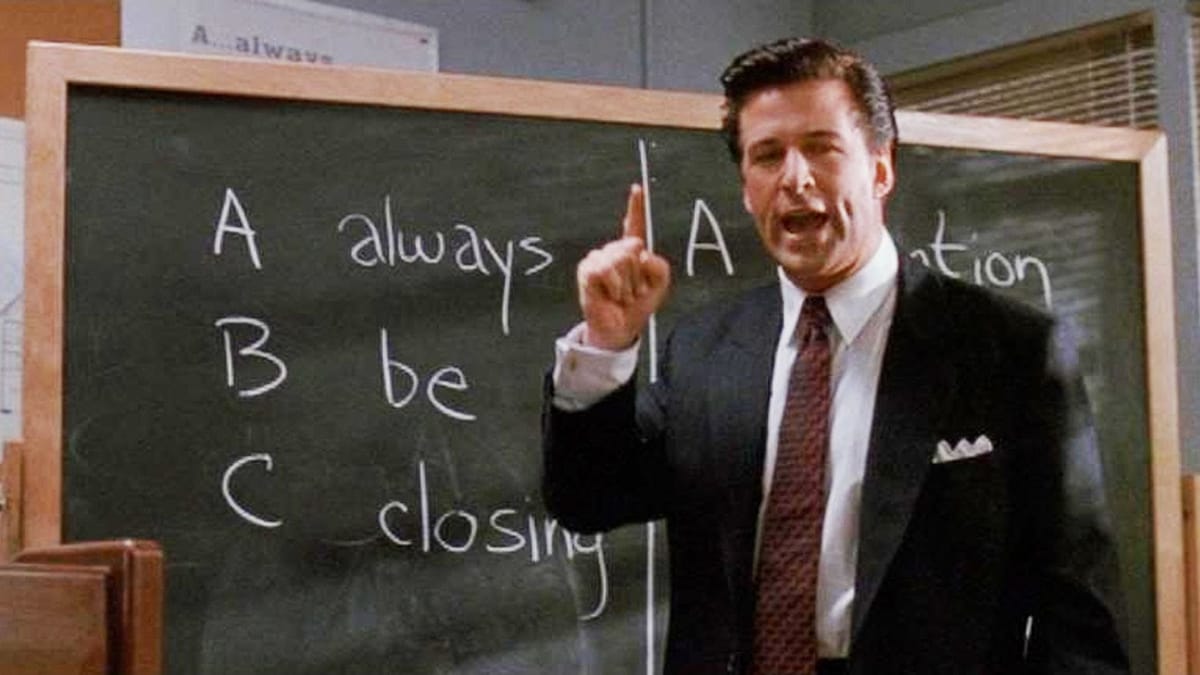Stop trying to sell your screenplay.
It’s not your job to sell your screenplay. That is for others. Your job is to give them something to sell.

The Story and Plot Weekly Email is published every Tuesday morning. Don't miss another one.
It was a conversation with my manager many years ago that somehow made me realize something that all similar conversations in the years before failed to do.
I needed work at the time. Actual employment. My health insurance was running out, and only writing assignments count towards that. Options, bonuses, and sales don't contribute to health and pension.
Now, I don't know if it was the timing, or just the way she said it, or maybe I was just ready to hear it, but she had a certain exasperation in her voice, "Tom, you have to give me something to work with. You have to arm me with something."
Somehow, it all just became clear in that moment.
It's stupid in hindsight, and it really exposes my self-centeredness, but until then, I had this fantasy that it was my job to write what I wanted to write, and their job to monetize it. To sell it.
But in that moment, I realized, they're not selling, they're just passing it along.
In my mind, it was the execution of the script that was the pitch. And the execution either sold or it didn't.
But that isn't the case. The execution is how you close a deal with a buyer who is already interested.
But no one gets to the close if they don't get past the initial pitch.
And the initial pitch is the idea.
My manager knew that, "You need to arm me with something."
That something was the idea that got people excited.
It wasn't my job to write something and hope it sells.
It is my job to create something that is easy for her and everyone to sell to the next person above them.
People get excited before they read the screenplay.
This is how you get them to read the screenplay. It is how you control the pre-framing before they read a single word.
Is reading this screenplay a chore? Or are they hoping there's gold in them there hills?
You don't want to have to win them over during the read.
You win them over before they read with the logline, and more specifically, the concept that the logline contains.
You are not the only one who has to pitch this.
Everyone who touches the screenplay will have at least been pitched the logline.
And if they like it, then they will have to pitch that logline to someone else.
A reader will have to sell it to their boss, the VP. Their boss will have to sell it to their boss, the producer. The producer will have to pitch the idea to the studio. Someone will have to pitch it to the actor's agent, who will then have to pitch it to the actor. This goes on.
All of these people need to be convinced that the screenplay is worth reading, let alone being put on top of their pile.
Dozens, if not hundreds, of people will have to try to sell this screenplay to someone else and get that person excited.
You cannot sell it on their behalf.
You can't.
It's your job to give them all something to sell.
You do this with a concept that 1) promises great scenes, and 2) is easy to communicate from one person to another.
Back to the mental battle.
In my early days, my idea of a logline was, "Just read it, you will love it."
If you can picture me with a full head of hair rolling my eyes, go ahead and imagine that, too.
My energy was always directed towards, "If I could just get them to read it!"
+10 Points for confidence, I guess.
-50 points for stubbornness.
We imagine too often that others owe us a shot. They don't.
We treat submissions as if we're dealing with paid coverage services that are obligated to give us their full attention.
Early in my career, when someone passed on a project, I remember thinking, "Did they even read it?"
Because if they read it, surely they would have loved it, right?
Right?
RIGHT?
We insist on this big upfront investment of reading the screenplay, when 90% of the time, the logline is enough to tell us what we need to know.
An additional 9% can be determined through a one-page summary.
Yet, we don't like those things, so instead of US putting in the work, we ask the reader to.
It's a losing strategy.
It is not your job to tell anyone their business, either.
I've had queries try to "sell" me the business side of a project.
"This market is big right now."
"This movie did really well, so this movie will, too."
Producers and executives know their business. And if they don't, they don't know that they don't know their business. Either way, they don't want or need your input.
No one has ever been talked into being excited about a project they weren't excited about.
The goal is to go viral in the office.
You want the person's eyes to go wide when they hear the idea. Why do the eyes go wide? Because two thoughts hit them almost at once.
Their first thought is, "That sounds great!"
And their next thought is, "I can sell this to others."
They have those thoughts because what they hear:
- Promises great scenes.
- Is easy to communicate.
This is the true value of intellectual property. And it's how we duplicate that value with our original work.
Here are some ways to attack it:
The Title.
Put the idea in the title. There is nothing wrong with starting with a title, as long as the title isn't the only thing of value when you're done.
- SNAKES ON A PLANE
- BAD SANTA
- DIRTY GRANDPA
The Six Words.
The idea here is that the film should be pitched in six words or fewer. Being that strict about it sounds kind of silly to me, but the idea that it is nearly instantaneous is accurate.
- An alien sleeper agent.
- A psychopath kills you in your dreams for real.
- Make noise, monsters will kill you.
- 30-somethings relive college by starting a fraternity.
Comps
This one is dear to my heart because the first screenplay I ever sold was "JACOB'S LADDER meets THE FUGITIVE."
Writers will often get the use of comps wrong when they confuse comps used to communicate TONE versus when they're used to communicate THE IDEA.
When they're used to communicate the idea, like these examples, they need to evoke something of a narrative. As always, the point is to promise great scenes.
- JAWS in space.
- GHOSTBUSTERS with aliens.
- DIE HARD on a battleship.
A short sci-fi story just sold and the comps were GRAVITY and ARRIVAL. And man, that sounds cool. What a great idea!
You could have also pitched this idea as THE ABYSS in space!
The logline.
You will always share the full logline. The logline contains the concept, as well as who the protagonist is and the narrative conflict.
And while the concept is the thing of value, sometimes, you need the whole logline to express it.
The Story
This one is harder, but it is doable.
And when I say "story," I don't mean the screenplay. I mean the writer's story and their connection to the material.
So maybe this story about paramedics isn't the most high-concept idea ever. But it's written by a 30-year veteran paramedic. Now it's more interesting.
This is a story someone could take to their boss.
My friend Melissa got her career started with a script about a civil rights court case. Not the most obvious blockbuster idea.
But Melissa was a working lawyer at the time, writing what she knew. That was a story someone could take to their boss. A working lawyer writes about a court case.
That gets the screenplay read.
This story becomes the interesting part.
This is why nepotism is so powerful even outside of direct connections. The story itself becomes the pitch.
"This was written by Lawrence Kasdan's kid."
Or, "Cronenberg? Is that...?"
"Yep! That's his kid!"
This little connection is now enough of a tibit to make it memorable and transmit to others.
The screenplay still has to close the deal.
Whatever tactic you use to get people excited to read your screenplay, the material still has to follow through.
You still have to deliver on what you promised.
But you have to get them to read your script.
Not just the first-level readers. But the second level. And the level after that.
These people are all your allies.
They are not adversaries you have to conquer.
If you're going to get this movie made, or even just move your career ahead, you're going to need every single one of them.
And the best way for them to help you is for you to help them first.
Give them something they can sell.
Give them an idea that promises great scenes, and is as communicable as a meme.
It's not your job to sell them.
It's your job to give them something they can sell.
Want to dig ever deeper?
If you enjoyed this email, you will love my newest mini-course Concept is King.
Validate your idea before investing months into a new screenplay. This course provides a consistent and repeatable process to get it right every time
Check out the Story and Plot mini-course. Concept is King.
The Story and Plot Weekly Email is published every Tuesday morning. Don't miss another one.
When you're ready, these are ways I can help you:
WORK WITH ME 1:1
1-on-1 Coaching | Screenplay Consultation
TAKE A COURSE
Mastering Structure | Idea To Outline




